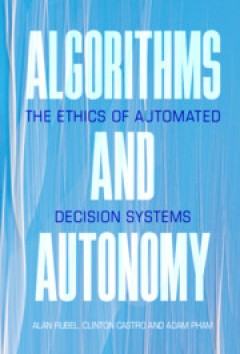Filter by

Algorithms and Autonomy : The Ethics of Automated Decision Systems
Algorithms influence every facet of modern life: criminal justice, education, housing, entertainment, elections, social media, news feeds, work… the list goes on. Delegating important decisions to machines, however, gives rise to deep moral concerns about responsibility, transparency, freedom, fairness, and democracy. Algorithms and Autonomy connects these concerns to the core human value of …
- Edition
- -
- ISBN/ISSN
- 9781108895057
- Collation
- viii, 218 p ; ill
- Series Title
- -
- Call Number
- 174.90063 ALG A

Dangerous science : science policy and risk analysis for scientists and engin…
The public is generally enthusiastic about the latest science and technology, but sometimes research threatens the physical safety or ethical norms of society. When this happens, scientists and engineers can find themselves unprepared in the midst of an intense science policy debate. In the absence of convincing evidence, technological optimists and skeptics struggle to build consensus. In thes…
- Edition
- -
- ISBN/ISSN
- 9781911529880
- Collation
- ix. ;162 p.
- Series Title
- -
- Call Number
- 501.51. DAN d

Animal death
Animal death is a complex, uncomfortable, depressing, motivating and sensitive topic. For those scholars participating in Human-Animal Studies, it is – accompanied by the concept of 'life' – the ground upon which their studies commence, whether those studies are historical, archaeological, social, philosophical, or cultural. It is a tough subject to face, but as this volume demonstrates, on…
- Edition
- -
- ISBN/ISSN
- 9781743325247
- Collation
- xv. :ill. ;351 p.
- Series Title
- -
- Call Number
- 179.3. JAY a

Hidden histories of the dead : disputed bodies in modern British medical rese…
In this discipline-redefining book, Elizabeth T. Hurren maps the post-mortem journeys of bodies, body-parts, organs, and brains, inside the secretive culture of modern British medical research after WWII as the bodies of the deceased were harvested as bio-commons. Often the human stories behind these bodies were dissected, discarded, or destroyed in death. Hidden Histories of the Dead recovers …
- Edition
- -
- ISBN/ISSN
- 9781108633154
- Collation
- xvii, 322 p. ; ill
- Series Title
- -
- Call Number
- 174.20941 HUR h

Handbook the global history of work
What is the day-to-day reality for workers in various parts of the world, and how was it in the past? How do they work today, and how did they work in the past? Did workers ever protest? If so, how? These and many other questions comprise the field of the global history of work - a young discipline that is introduced with this handbook.
- Edition
- -
- ISBN/ISSN
- 9783110424584
- Collation
- vii, 604p.
- Series Title
- -
- Call Number
- 174 HOF h

Big and little histories : sizing up ethics in historiography
This book introduces students to ethics in historiography through an exploration of how historians in different times and places have explained how history ought to be written and how those views relate to different understandings of ethics. No two histories are the same. The book argues that this is a good thing because the differences between histories are largely a matter of ethics. Looking …
- Edition
- -
- ISBN/ISSN
- 9780429399992
- Collation
- XI, 209 p.
- Series Title
- -
- Call Number
- 174.99072 HUG b

Animals in our midst : the challenges of co-existing with animals in the anth…
This Open Access book brings together authoritative voices in animal and environmental ethics, who address the many different facets of changing human-animal relationships in the Anthropocene. As we are living in complex times, the issue of how to establish meaningful relationships with other animals under Anthropocene conditions needs to be approached from a multitude of angles. This book offe…
- Edition
- -
- ISBN/ISSN
- 9783030635237
- Collation
- xiii, 579p. : ill.
- Series Title
- -
- Call Number
- 179.3 ANI a

Robotics, AI, and humanity : science, ethics, and policy
This open access book examines recent advances in how artificial intelligence (AI) and robotics have elicited widespread debate over their benefits and drawbacks for humanity. The emergent technologies have for instance implications within medicine and health care, employment, transport, manufacturing, agriculture, and armed conflict. While there has been considerable attention devoted to robot…
- Edition
- -
- ISBN/ISSN
- 9783030541736
- Collation
- x, 269p. : ill.
- Series Title
- -
- Call Number
- 174.9629892 ROB r

Artificial intelligence for a better future : an ecosystem perspective on the…
This open access book proposes a novel approach to Artificial Intelligence (AI) ethics. AI offers many advantages: better and faster medical diagnoses, improved business processes and efficiency, and the automation of boring work. But undesirable and ethically problematic consequences are possible too: biases and discrimination, breaches of privacy and security, and societal distortions such as…
- Edition
- -
- ISBN/ISSN
- 9783030699789
- Collation
- x, 124p. : ill.
- Series Title
- -
- Call Number
- 174.90063 STA a

Cow care in Hindu animal ethics
This open access book provides both a broad perspective and a focused examination of cow care as a subject of widespread ethical concern in India, and increasingly in other parts of the world. In the face of what has persisted as a highly charged political issue over cow protection in India, intellectual space must be made to bring the wealth of Indian traditional ethical discourse to bear on t…
- Edition
- -
- ISBN/ISSN
- 9783030284084
- Collation
- xxx, 269p. : ill.
- Series Title
- -
- Call Number
- 179.3 VAL c
 Computer Science, Information & General Works
Computer Science, Information & General Works  Philosophy & Psychology
Philosophy & Psychology  Religion
Religion  Social Sciences
Social Sciences  Language
Language  Pure Science
Pure Science  Applied Sciences
Applied Sciences  Art & Recreation
Art & Recreation  Literature
Literature  History & Geography
History & Geography